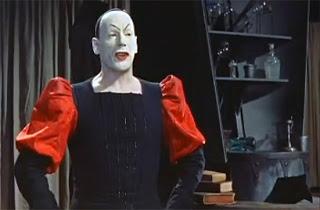 Peter Gorski's Faust (1960) records Gustaf Grundgens' legendary performance as Mephistopheles, considered the definitive portrayal of Goethe's charming demon. Those who recognize Grundgens as German cinema's stock villain, or the Nazi collaborator caricatured in Klaus Mann's Mephisto, will find it intriguing.
Peter Gorski's Faust (1960) records Gustaf Grundgens' legendary performance as Mephistopheles, considered the definitive portrayal of Goethe's charming demon. Those who recognize Grundgens as German cinema's stock villain, or the Nazi collaborator caricatured in Klaus Mann's Mephisto, will find it intriguing.Faust (Willi Quadflieg) is a scholar bored with earthly knowledge. He's tempted by Mephistopheles (Gustaf Grundgens), who bets Faust's soul in a wager with God (Hermann Schomberg). Mephistopheles promises Faust Earthly delights, from drinking to carnal knowledge. Then Faust becomes smitten with Gretchen (Ella Buchi), an innocent village girl, pledging anything to win her heart.
Faust faithfully adapts Goethe. Gorski, Grundgens' adoptive son, restages the Deutsches Schauspielerhaus production with the same cast and sets, adding minimal montage or affect. His only cinematic affectation is an expanded version of Walpurgisnacht, a demonic Bacchanal featuring swing music and hundreds of extras wearing animal masks and Robbie the Robot costumes. It culminates in a mushroom cloud, jarringly juxtaposing Faust's dilemma with modern amorality.
Goethe's play highlights human frailty and arrogance. Faust rejects God, rewrites the Bible and spurns simple pleasures, but love proves his undoing. He consorts with a witch (Gustl Busch) to make himself younger, bribes Gretchen with jewelry and fights her brother (Max Eckard). Mephistopheles peels away Faust's layers of morality, encouraging him to revel in sin.
Faust only covers the first part of Goethe's play, thus ending tragically. Faust belatedly rejects Mephistopheles and tries rescuing Gretchen, driven mad by guilt. Gretchen's simple faith contrasts with Faust's arrogant skepticism, Christianity versus materialism - a battle the Devil's happy to referee. Ultimately, Gretchen receives a "judgement" beyond Faust's rescue, leaving his wager unresolved.
Gustaf Grundgens acts to the hilt, unrestrained by cinematic subtlety. Besmeared in fright makeup, wearing black and crimson tights, Grundgens devours scenery whole. He woos Faust, cavorts with drunks, spurns a lusty widow's (Elisabeth Flickenschildt) advances while belting sour, off-key love ballads on a lute. Deviously charming yet outrageously outsized, Grundgens is great fun to watch.
Whether Faust is compelling comes down to taste. After all, it's more record of Grundgens, an electrifying stage actor straightjacketed on film, than cinematic confection. Even so, Goethe's text remains compelling and a great performance justifies itself.

